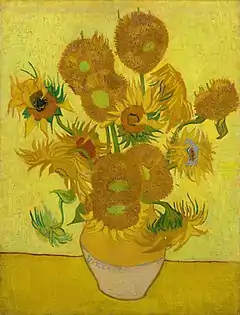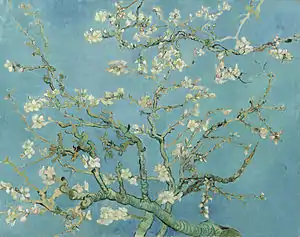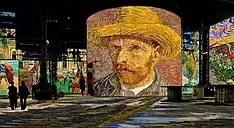Van Gogh Museum
The Van Gogh Museum is a Dutch art museum dedicated to the works of Vincent van Gogh and his contemporaries in the Museum Square in Amsterdam South, close to the Stedelijk Museum, the Rijksmuseum, and the Concertgebouw.[7] The museum opened on 2 June 1973,[1] and its buildings were designed by Gerrit Rietveld and Kisho Kurokawa.
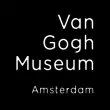 | |
.jpg.webp) Museum at the Museumplein in 2008 | |
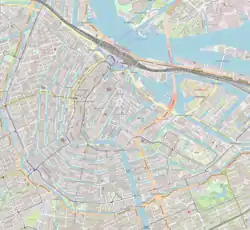 Location within the city center of Amsterdam | |
| Established | 2 June 1973[1] |
|---|---|
| Location | Paulus Potterstraat 7[2] Amsterdam, Netherlands |
| Coordinates | 52°21′30″N 04°52′52″E |
| Type | Art museum National museum |
| Visitors |
|
| Public transit access | Van Baerlestraat/Museumplein Tram line: 2, 3, 5, 12, 16, 24[2] |
| Website | www |
The museum contains the largest collection of Van Gogh's paintings and drawings in the world. In 2017, the museum had 2.3 million visitors and was the most-visited museum in the Netherlands, and the 23rd-most-visited art museum in the world. In 2019, the Van Gogh Museum launched the Meet Vincent Van Gogh Experience, a technology-driven "immersive exhibition" on Van Gogh's life and works, which has toured globally.
History
Unsold works
Upon Vincent van Gogh's death in 1890, his work not sold fell into the possession of his brother Theo. Theo died six months after Vincent, leaving the work in the possession of his widow, Johanna van Gogh-Bonger.[8] Selling many of Vincent's paintings with the ambition of spreading knowledge of his artwork, Johanna maintained a private collection of his works. The collection was inherited by her son Vincent Willem van Gogh in 1925, eventually loaned to the Stedelijk Museum in Amsterdam, where it was displayed for many years, and was transferred to the state-initiated Vincent van Gogh Foundation in 1962.[8]
Dedicated museum
Design for a Van Gogh Museum was commissioned by the Dutch government in 1963 to Dutch architect and furniture designer Gerrit Rietveld.[9] Rietveld died a year later, and the building was not completed until 1973,[10] when the museum opened its doors.[11] In 1998 and 1999, the building was renovated by the Dutch architect Martien van Goor,[12] and an exhibition wing by the Japanese architect Kisho Kurokawa was added.[13] In late 2012, the museum was closed for renovations for six months. During this period, 75 works from the collection were shown in the Hermitage Amsterdam.[14]
On 9 September 2013, the museum unveiled a long-lost Van Gogh painting that spent years in a Norwegian attic believed to be by another painter. It is the first full-size canvas by him discovered since 1928. Sunset at Montmajour depicts trees, bushes and sky, painted with Van Gogh's familiar thick brush strokes. It can be dated to the exact day it was painted because he described it in a letter to his brother, Theo, and said he painted it the previous day 4 July 1888.[15]
Art thefts
In 1991, twenty paintings were stolen from the museum, among them Van Gogh's early painting The Potato Eaters. Although the thieves escaped from the building, 35 minutes later all stolen paintings were recovered from an abandoned car. Three paintings – Wheatfield with Crows, Still Life with Bible, and Still Life with Fruit – were severely torn during the theft.[16] Four men, including two museum guards, were convicted for the theft and given six or seven-year sentences.[17] It is considered to be the largest art theft in the Netherlands since the Second World War.[18]
In 2002, two paintings were stolen from the museum, Congregation Leaving the Reformed Church in Nuenen and View of the Sea at Scheveningen.[19] Two Dutchmen were convicted for the theft to four-and-a-half-year sentences, but the paintings were not immediately recovered.[20][21] The museum offered a reward of €100,000 for information leading to the recovery of the paintings.[22] The FBI Art Crime Team listed the robbery on their Top Ten Art Crimes list, and estimates the combined value of the paintings at US$30 million.[23] In September 2016, both paintings were discovered by the Guardia di Finanza in Naples, Italy. The two artworks were found in a "relatively good state", according to the Van Gogh Museum.[24]
Buildings
The museum is situated at the Museumplein in Amsterdam-Zuid, on the Paulus Potterstraat 7, between the Stedelijk Museum and the Rijksmuseum,[25] and consists of two buildings, the Rietveld building, designed by Gerrit Rietveld, and the Kurokawa wing, designed by Kisho Kurokawa.[26] Museum offices are housed on Stadhouderskade 55 in Amsterdam-Zuid.[25]
Rietveld building
The Rietveld building is the main structure and houses the permanent collection. It has a rectangular floor plan and is four stories high. On the ground floor are a shop, a café, and an introductory exhibition. The first floor shows the works of Van Gogh grouped chronologically. The second floor gives information about the restoration of paintings and has a space for minor temporary exhibitions. The third floor shows paintings of Van Gogh's contemporaries in relationship to the work of Van Gogh himself.[27]
Collection
Works by Vincent van Gogh
.jpg.webp)
.jpg.webp)
The museum houses the largest Van Gogh collection in the world with 200 paintings, 400 drawings, and 700 letters by the artist.[29]
The main exhibition chronicles the various phases of Van Gogh's artistic life.
- His selected works from Nuenen (1880–1885):
- Avenue of Poplars in Autumn (1884)
- The Potato Eaters (1885)
- His selected works from Antwerp (1886):
- His selected works from Paris (1886–1888):
- His selected works from Arles (1888–1889):
- The Zouave (1888)
- Bedroom in Arles (1888)
- The Yellow House (1888)
- Sunflowers (1889)
- His selected works from Saint-Rémy (1889–1890):
- Almond Blossoms (1890)
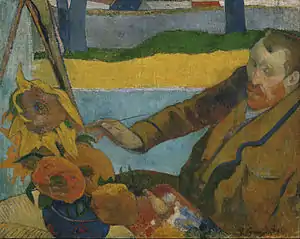
- And his selected works from Auvers-sur-Oise (1890):
- Wheatfield with Crows (1890)
The permanent collection also includes nine of the artist's self-portraits and some of his earliest paintings dating back to 1882.
Works by contemporaries
The museum also features notable artworks by Van Gogh's contemporaries in the Impressionist and post-Impressionist movements and holds extensive exhibitions on various subjects from 19th Century art history.
The museum has sculptures by Auguste Rodin and Jules Dalou, and paintings by John Russell, Émile Bernard, Maurice Denis, Kees van Dongen, Paul Gauguin, Édouard Manet, Claude Monet, Odilon Redon, Georges Seurat, Paul Signac, and Henri de Toulouse-Lautrec.[30]
Meet Vincent Van Gogh Experience
The Van Gogh Museum manages an official Meet Vincent Van Gogh Experience, described as a travelling "3D immersive exhibition" using technology and computer audio-visual techniques to cover the story of Van Gogh's life through images of his works.[31] The first "experience" was in 2016 in Beijing,[32][33] and it has since been toured globally to Europe, Asia and North America.[34]
The Meet Van Gogh Experience does not present original artworks, as they are too fragile to travel.[34] The "experience" was designed in collaboration with the London-based museum design consultancy, Event Communications (who designed Titanic Belfast),[35] and it won a 2017 THEA award in the category of Immersive Museum Exhibit: Touring.[36]
Visitors
| year | visitors | year | visitors |
|---|---|---|---|
| 2000 | 1,312,204[37] | 2010 | 1,429,854[38] |
| 2001 | 1,276,309[37] | 2011 | 1,600,298[38] |
| 2002 | 1,592,771[37] | 2012 | 1,438,000[39] |
| 2003 | 1,341,586[38] | 2013 | 1,448,997[40] |
| 2004 | 1,338,105[38] | 2014 | 1,608,849[41] |
| 2005 | 1,417,096[38] | 2015 | 1,900,000[4] |
| 2006 | 1,677,268[38] | 2016 | 2,100,000[3] |
| 2007 | 1,559,783[38] | 2017 | 2,255,010 |
| 2008 | 1,474,816[38] | 2018 | 2,190,000 |
| 2009 | 1,451,139[38] | 2019 | - |
The Van Gogh Museum, which is a national museum (Dutch: rijksmuseum),[42] is a foundation (Dutch: stichting).[43]
Axel Rüger, who had been the museum director since 2006,[43][44] left the museum in 2019 to become secretary and chief executive of the Royal Academy of Arts in London.[45] The Van Gogh Museum announced that Managing Director Adriaan Dönszelmann would act as general director until a new director is appointed.[46]
Since 2000, the museum had between 1.2 and 1.9 million visitors per year.[4][37][38][39][40][41] From 2010 to 2012, it was the most visited museum in the Netherlands.[47][48][49] In 2015, the museum had 1.9 million visitors,[4] it was the 2nd most visited museum in the Netherlands, after the Rijksmuseum,[5] and the 31st most visited art museum in the world.[6]
The Van Gogh Museum is a member of the national Museumvereniging (Museum Association).[50]
References
- (in Dutch) Ronald de Leeuw, "Introduction: the Van Gogh Museum as a National Museum, 1973-1994", Van Gogh Museum Journal, 1995. Retrieved 9 July 2014.
- Address, accessibility, directions and parking, Van Gogh Museum. Retrieved 9 July 2014.
- Jasper Piersma, "Van Gogh Museum zit Rijks op de hielen als populairste museum" (in Dutch), Het Parool, 2016. Retrieved 3 January 2017.
- (in Dutch) "Bezoekersrecords voor Van Gogh Museum en NEMO", AT5, 2015. Retrieved 15 January 2016.
- (in Dutch) Yannick Verberckmoes, "Veel meer bezoekers voor grootste Nederlandse musea", de Volkskrant, 2015. Retrieved 16 July 2016.
- Top 100 Art Museum Attendance, The Art Newspaper, 2016. Retrieved 16 July 2016.
- Museumplein, Archived 13 August 2012 at the Wayback Machine I Amsterdam. Retrieved 17 October 2012.
- Van Gogh's Van Goghs: The Van Gogh Museum, National Gallery of Art, retrieved 23 April 2011
- The Van Gogh Museum In Amsterdam Hosts Our Editor ~ The World's Largest Collection of Van Gogh's Artwork, Art Knowledge News, retrieved 23 April 2011
- Gerrit Thomas Rietveld, SFMOMA, archived from the original on 28 July 2010, retrieved 23 April 2011
- The Organization, Van Gogh Museum. Retrieved 30 January 2012.
- The museum's architecture in overview, Van Gogh Museum. Retrieved 6 February 2012.
- New Wing of the Van Gogh Museum, Kisho Kurokawa architect & associates, 2006, retrieved 23 April 2011
- Dan Saltzstein, "Amsterdam’s Van Gogh Museum to Close for Renovations", New York Times, 2011. Retrieved 5 February 2012.
- "New Van Gogh Painting Unveiled in Amsterdam". NY Times. Retrieved 9 September 2013.
- Paul L. Montgomery, "Lost and Found: Huge van Gogh Theft Fails", New York Times, 1991. Retrieved 31 January 2012.
- (in Dutch) "Rovers Van Gogh in hoger beroep forser gestraft", Trouw, 1992. Retrieved 24 February 2012.
- (in Dutch) "Diefstal Van Goghs grootste kunstroof in Nederland" (subscribers only), NRC Handelsblad, 1991. Retrieved 24 February 2012.
- "Two van Gogh Works Are Stolen in Amsterdam", New York Times, 2002. Retrieved 5 February 2012.
- Lawrence Van Gelder, "Jail for Van Gogh Thieves", New York Times, 2004. Retrieved 5 February 2012.
- (in Dutch) "Ook bij hof veroordeling van rovers", de Volkskrant, 2005. Retrieved 5 February 2012.
- Van Gogh Museum offers reward for information about theft of paintings (press release), Van Gogh Museum, 2003. Retrieved 5 February 2012.
- Van Gogh Museum Robbery Archived 14 April 2016 at the Wayback Machine, Federal Bureau of Investigation. Retrieved 23 February 2012.
- "Van Gogh paintings stolen from Amsterdam found in Italy". BBC News. 30 September 2016. Retrieved 30 September 2016.
- Contact, Van Gogh Museum. Retrieved 3 February 2012.
- The museum's architecture in overview, Van Gogh Museum. Retrieved 5 February 2012.
- (in Dutch) Informatie (Dutch visitor's brochure, February 2012), Van Gogh Museum.
- The layout, Van Gogh Museum. Retrieved 5 February 2012.
- History of the collection, Van Gogh Museum. Retrieved 30 January 2012.
- Other artists in the collection, Van Gogh Museum. Retrieved 30 January 2012.
- "Step into his Life". Event Communications. 2019. Retrieved 8 October 2019.
- Mica Kelmachte (9 August 2016). "3D Vincent Van Gogh Universe Launches In Beijing". Forbes.
- "Meet Vincent Van Gogh Experience Press Roundup from Beijing". Event Communications. Retrieved 8 October 2019.
- "Meet Vincent van Gogh Experience". Van Gogh Museum. Retrieved 8 October 2019.
- "ELBOW PRODUCTIONS CELEBRATES OPENING OF "MEET VINCENT VAN GOGH" WITH EVENT". MuseumInsider. 11 July 2016. Retrieved 6 October 2019.
- "Past Thea Award recipients: 1994-2018". Themed Entertainment Association. Retrieved 5 October 2019.
- Van Gogh Museum closes Van Gogh's 150th anniversary year successfully with 1.3 million visitors (press release), Van Gogh Museum, 2004. Retrieved 13 July 2014.
- Numbers of Visitors, Van Gogh Museum, 2012. Retrieved 19 September 2013.
- Van Gogh Museum Collection visited by almost 1.5 million culture lovers from around the world, Van Gogh Museum, 2012. Retrieved 2 January 2013.
- Numbers of Visitors, Van Gogh Museum. Retrieved 28 June 2014.
- (in Dutch) Bezoekcijfers, Van Gogh Museum. Retrieved 29 October 2015.
- (in Dutch) Max van Rooij, "Een schitterend, alles overstralend pantser", NRC Handelsblad, 1999. Retrieved 13 July 2014.
- Management, Van Gogh Museum. Retrieved 13 July 2014.
- (in Dutch) "Duitser Axel Rüger nieuwe directeur Van Gogh Museum", de Volkskrant, 2006. Retrieved 13 July 2014.
- Jhala, Kabir (13 February 2019). "Axel Rüger, director of Van Gogh Museum in Amsterdam, appointed new chief executive of Royal Academy". theartnewspaper.com. Retrieved 21 June 2019.
- "Management Team - Van Gogh Museum". www.vangoghmuseum.nl. Retrieved 21 June 2019.
- (in Dutch) Top 55 Museumbezoek 2010. Nederlandse Museumvereniging. Retrieved 3 February 2012.
- (in Dutch) Top 55 Museumbezoek 2011. Nederlandse Museumvereniging. Retrieved 3 February 2012.
- (in Dutch) Top 55 Museumbezoek 2012 Archived 21 September 2013 at the Wayback Machine, Nederlandse Museumvereniging. Retrieved 19 September 2013.
- (in Dutch) Van Gogh Museum, Museumvereniging. Retrieved 13 July 2014.
External links
| Wikimedia Commons has media related to Van Gogh Museum. |
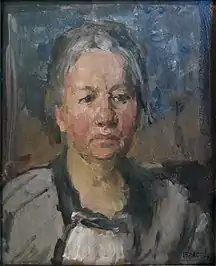


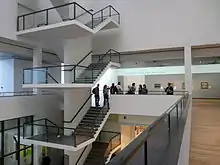
.jpg.webp)
